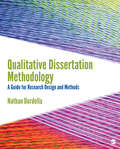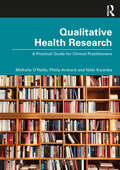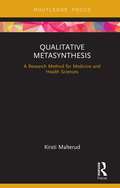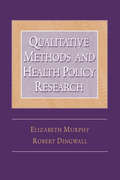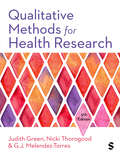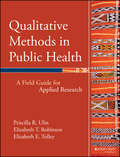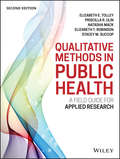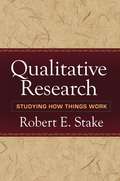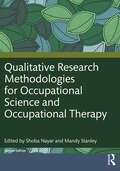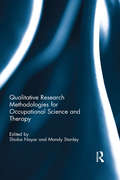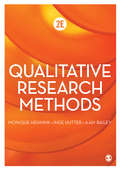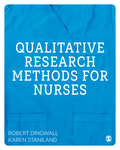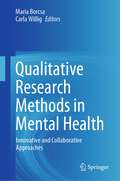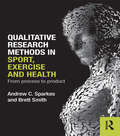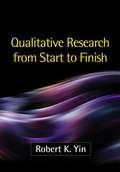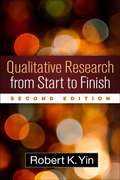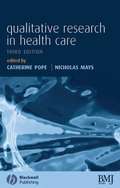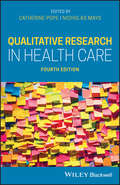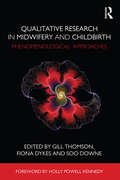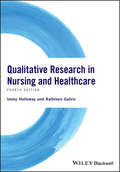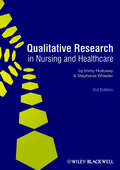- Table View
- List View
Qualitative Dissertation Methodology: A Guide for Research Design and Methods
by Nathan Richard DurdellaDesigning and writing a qualitative dissertation methodology chapter can be done! Qualitative Dissertation Methodology: A Guide for Research Design and Methods functions as a dissertation advisor to help students construct and write a qualitative methodological framework for their research. Drawing from the challenges author Nathan Durdella has experienced while supervising students, the book breaks down producing the dissertation chapter into smaller pieces and goes through each portion of the methodology process step by step. With a warm and supportive tone, he walks students through the process from the very start, from choosing chairs and developing qualitative support networks to outlining the qualitative chapter and delving into the writing. By the end of the book, students will have completed the most challenging chapter of a qualitative dissertation and laid a strong foundation for the rest of their dissertation work. Corresponding videos featuring the author help concepts come alive for your students.
Qualitative Dissertation Methodology: A Guide for Research Design and Methods
by Nathan Richard DurdellaDesigning and writing a qualitative dissertation methodology chapter can be done! Qualitative Dissertation Methodology: A Guide for Research Design and Methods functions as a dissertation advisor to help students construct and write a qualitative methodological framework for their research. Drawing from the challenges author Nathan Durdella has experienced while supervising students, the book breaks down producing the dissertation chapter into smaller pieces and goes through each portion of the methodology process step by step. With a warm and supportive tone, he walks students through the process from the very start, from choosing chairs and developing qualitative support networks to outlining the qualitative chapter and delving into the writing. By the end of the book, students will have completed the most challenging chapter of a qualitative dissertation and laid a strong foundation for the rest of their dissertation work. Corresponding videos featuring the author help concepts come alive for your students.
Qualitative Health Research: A Practical Guide for Clinical Practitioners
by Nikki Kiyimba Michelle O' Reilly Philip ArchardThis accessible text supports health practitioners undertaking qualitative research to inform clinical practice, guiding readers through the decision-making process from planning and proposing, through data collection, to dissemination and impact. Qualitative research makes an important contribution to the health evidence base, including improving service provision, practitioner communication, and patient safety, as well as informing policies, generating important knowledge about health, and providing populations with a voice in the health context.Balancing the need for practitioners to operate in an evidence-informed way, the increasing role of a research culture in the health service, and the everyday clinical demands faced in practice, this book includes strategies for managing the reality of undertaking qualitative research while working in clinical practice and includes a wide range of “bite size” chapters on topics such as: Quality improvement Evidence-based practice and practice-based evidence Managing dual roles Planning a project Working with stakeholders Ethics Data collection methods Conducting digital research Recruitment and sampling Data management Analytical approaches Thematic approaches Research with vulnerable groups Dissemination Translating research into practice. This book is a practical resource for clinical researchers, designed to support the application of learning. Each chapter opens with learning objectives, and ends with a reflection on the chapter, integrating case examples and highlighting core issues. Practitioner experience boxes and reflective activities bring an invaluable real-world perspective to each chapter.Qualitative Health Research is the ideal text for all healthcare practitioners and trainees new to qualitative research, including those from medicine, nursing, midwifery, psychology, allied health, and public health.
Qualitative Metasynthesis: A Research Method for Medicine and Health Sciences
by Kirsti MalterudQualitative Metasynthesis presents a research method developed for upcycling and synthesis of qualitative primary studies, aimed at researchers within medicine and health sciences.This book demonstrates how and why qualitative metasynthesis can be a method for reuse and expansion of medical knowledge. It presents the principles of metasynthesis as a qualitative research method, so that the reader can assess whether this is a research strategy that fits the aim of their study. The author offers practical advice for conducting research using this methodology. The presentation is illustrated by a study carried out by the author and collaborators, reflecting on real-life challenges and solutions as an example of meta-ethnography, one of the most frequently used strategies for qualitative metasynthesis. The author also looks at systematic reviews, a methodology developed within in the tradition of evidence-based medicine, discussing strengths, weaknesses and pitfalls of this methodology. Rooted in the interpretative paradigm, qualitative metasynthesis challenges several of the principles from the evidence-based medicine tradition, offering reflections on challenges when epistemologically very different methodologies intersect.This book should be considered essential reading for anyone carrying out qualitative research within the fields of medicine, health and social care.
Qualitative Methods and Health Policy Research (Social Problems And Social Issues Ser.)
by Elizabeth MurphyQualitative researchers have traditionally been cautious about claiming that their work was scientific. The "right-on" schools have exaggerated this caution into an outright rejection of science as a model for their work. Science is, for them, outmoded; "an archaic form of consciousness surviving for a while yet in a degraded form" (Tyler 1986:200). Scientists' assertions that they are in pursuit of truth simply camouflage their own lust for power. There is no essential difference between truth and propaganda.The authors acknowledge that the boundary between science and propaganda has often been breached and some distrust of scientific claims may be healthy. They also question the claim that science creates disinterested and objective knowledge of an observer-independent world without concluding that science is impossible. The skeptics' reservations about qualitative research are based on the deep-rooted assumption among natural scientists, and some social scientists, that there is a world "out there," prior to, and independent of, their observations. This world can be known objectively in the sense that all observers will, if identically placed, see it in exactly the same way. If a suitable language were available, they would also all produce identical descriptions. From these observations they can work out the laws governing the world's operations. The authors try to resolve these contrary claims by asserting that science is a procedural commitment. It consists of openness to refutation, a conscientious and systematic search for contradictory evidence, and a readiness to subject one's preconceptions to critical examination. The devotion to truth as a regulative ideal is an essential difference between science and propaganda. This work is a unique and innovative defense of scientific method.
Qualitative Methods for Health Research (Introducing Qualitative Methods series)
by Judith Green Nicki Thorogood G.J. Melendez-TorresWhether you are looking to interpret and evaluate existing health research, or conduct your own, this book discusses every step of the research process, from theory and ethics to data collection, analysis and dissemination. Clear, engaging and drawing on diverse examples from various health disciplines – from public health and nursing to occupational health and nutrition – this fifth edition: Offers detailed guidance on synthesising and integrating evidence, with a new chapter on systematic reviews. Fully embeds material on the effective use of digital and social media research in health across all chapters. Showcases what health research looks like in practice, with 28 case studies from across the globe. Ideal for undergraduates, postgraduates and beginner researchers in health and related fields, this book is a vital resource for building your confidence in understanding and doing qualitative research.
Qualitative Methods for Health Research (Introducing Qualitative Methods series)
by Judith Green Nicki Thorogood G.J. Melendez-TorresWhether you are looking to interpret and evaluate existing health research, or conduct your own, this book discusses every step of the research process, from theory and ethics to data collection, analysis and dissemination. Clear, engaging and drawing on diverse examples from various health disciplines – from public health and nursing to occupational health and nutrition – this fifth edition: Offers detailed guidance on synthesising and integrating evidence, with a new chapter on systematic reviews. Fully embeds material on the effective use of digital and social media research in health across all chapters. Showcases what health research looks like in practice, with 28 case studies from across the globe. Ideal for undergraduates, postgraduates and beginner researchers in health and related fields, this book is a vital resource for building your confidence in understanding and doing qualitative research.
Qualitative Methods in Public Health
by Elizabeth E. Tolley Elizabeth T. Robinson Priscilla R. UlinQualitative Methods in Public Health is a comprehensive resource that presents practical strategies and methods for using qualitative research and includes the basic logic and rationale for making qualitative research decisions. <P><P>This important book outlines the complexities, advantages, and limitations of qualitative methods and offers information and step-by-step procedures for every phase of research¾from theory to study design, data collection, analysis, interpretation, writing, and dissemination. Written for faculty, students, and practitioners in public health research, promotion, and education Qualitative Methods in Public Health will help those with prior research experience expand their repertoire to include qualitative methods. The book also contains up-to-date illustrations from a wealth of topics such as reproductive choice, sexual risk and protection, gender relations, and other areas critical to understanding population, health, and disease. Qualitative Methods in Public Health includes Examples of mixed qualitative-quantitative research design Guidelines for discussions, sample budgets, and caveats for planning and implementing focus groups Sample agenda for training interviewers A summary of needed critical appraisal skills Tips on where to publish the results Sample brochure to share qualitative study findings with participating communities A comprehensive index
Qualitative Methods in Public Health: A Field Guide for Applied Research
by Elizabeth E. Tolley Elizabeth T. Robinson Priscilla R. Ulin Stacey M. Succop Natasha MackA real-world guide to conducting rigorous qualitative research Qualitative Methods in Public Health: A Field Guide for Applied Research provides a practical orientation to conducting effective qualitative research in the public health sphere. With thorough examination and simple explanations, this book guides you through the logic and workflow of qualitative approaches, with step-by-step guidance on every phase of the research. Students learn how to identify and make use of theoretical frameworks to guide your study, design the study to answer specific questions, and achieve their research goals. Data collection, analysis, and interpretation are given close attention as the backbone of a successful study, and expert insight on reporting and dissemination helps you get your work noticed. This second edition features new examples from global health, including case studies specifically illustrating study design, web and mobile technologies, mixed methods, and new innovations in information dissemination. Pedagogical tools have been added to help enhance your understanding of research design and implementation, and extensive appendices show you how these concepts work in practice. Qualitative research is a powerful tool for public health, but it's very easy to get it wrong. Careful study design and data management are critical, and it's important to resist drawing conclusions that the data cannot support. This book shows you how to conduct high-quality qualitative research that stands up to review. Design robust qualitative studies and collect the appropriate data Translate your data into words without sacrificing accuracy Merge qualitative and quantitative data to tell the whole story Master the logistics of consent, interviews, focus groups, and more Effective public health programs require insight into the different contexts that affect behavior. A thorough understanding--and appropriate application--of qualitative research strategies is the difference between relevant and credible conclusions and pseudoscience. Qualitative Methods in Public Health shows you how to get it right every step of the way.
Qualitative Research
by Robert Stake Janet UsingerThis book provides invaluable guidance for thinking through and planning a qualitative study. Rather than offering recipes for specific techniques, master storyteller Robert Stake stimulates readers to discover "how things work" in organizations, programs, communities, and other systems. Topics range from identifying a research question to selecting methods, gathering data, interpreting and analyzing the results, and producing a well-thought-through written report. In-depth examples from actual studies emphasize the role of the researcher as instrument and interpreter, while boxed vignettes and learning projects encourage self-reflection and critical thinking. Other useful pedagogical features include quick-reference tables and charts, sample project management forms, and an end-of-book glossary. After reading this book, doctoral students and novice qualitative researchers will be able to plan a study from beginning to end.
Qualitative Research Methodologies for Occupational Science and Occupational Therapy
by Mandy Stanley Shoba NayarThis comprehensive text provides a practical introduction to the range of qualitative methodologies and methods being used by occupational science and occupational therapy researchers today, enabling readers to produce and critique high-quality qualitative research themselves. Showcasing a diverse range of qualitative research from both academic scholarship and the wider community of health professionals, each chapter combines both foundational knowledge and therapeutic applications. Importantly, the book lucidly explains the synergy between research problem, choice of methodology, and methods. It also fosters a best-practice approach, ensuring that qualitative research is epistemologically sound while reflecting the values and beliefs of the diverse communities within which research is conducted. This new edition, featuring an international range of authors, also addresses new and cutting-edge research methodologies, including indigenous methodologies, netnography, the visual arts, and Big data. It is the ideal textbook for any student, practitioner, or researcher of occupational science and occupational therapy.
Qualitative Research Methodologies for Occupational Science and Therapy
by Mandy Stanley Shoba NayarThe push for evidence-based practice has increased the demand for high-quality occupational science and occupational therapy research from conceptualisation of the study through to publication. This invaluable collection explores how to produce rigorous qualitative research by presenting and discussing a range of methodologies and methods that can be used in the fields of occupational science and therapy. Each chapter, written by an experienced researcher in the relevant methodology, includes examples of research, foundational knowledge and therapeutic applications. Including new and cutting-edge methodologies, the book covers: Qualitative Descriptive Grounded Theory Phenomenology Narrative Ethnography Action Research Case Study Critical Discourse Analysis Visual Methodologies Metasynthesis Appreciative Inquiry Critical Theory and Philosophy Designed for occupational science and occupational therapy researchers, this book develops the reader’s ability to produce and critique high quality qualitative research that is epistemologically sound and rigorous.
Qualitative Research Methods
by Monique Hennink Inge Hutter Ajay BaileyPractical and straightforward, this book is a multidisciplinary introduction to the process of planning, conducting and analysing qualitative research, from selecting appropriate methods to publishing your findings. Built around the authors’ Qualitative Research Cycle – consisting of the design, data collection and analytic cycles – this pragmatic guide clearly demonstrates the steps you need to take to ensure your research is rigorous and robust. Drawing on decades of experience teaching workshops, the book is packed with techniques and tools to help you turn theory and method into research practice. This second edition: Showcases the importance of linking research design to data analysis, helping you avoid potential pitfalls and get the most out of your data Highlights the relevance and wide application of qualitative methods with an array of international examples of real field research and interdisciplinary case studies Gives clear guidance on writing qualitative research, including how to respond to critiques of qualitative methods Has a renewed focus on evaluating quality in qualitative research, ensuring your work is valid, reflexive and ethical Offering tried and tested research tools like interview guides that you can apply to your own projects and supported by online resources including checklists and reflective questions, this book is the perfect companion for anyone looking to complete a successful project using qualitative research methods.
Qualitative Research Methods
by Monique Hennink Inge Hutter Ajay BaileyPractical and straightforward, this book is a multidisciplinary introduction to the process of planning, conducting and analysing qualitative research, from selecting appropriate methods to publishing your findings. Built around the authors’ Qualitative Research Cycle – consisting of the design, data collection and analytic cycles – this pragmatic guide clearly demonstrates the steps you need to take to ensure your research is rigorous and robust. Drawing on decades of experience teaching workshops, the book is packed with techniques and tools to help you turn theory and method into research practice. This second edition: Showcases the importance of linking research design to data analysis, helping you avoid potential pitfalls and get the most out of your data Highlights the relevance and wide application of qualitative methods with an array of international examples of real field research and interdisciplinary case studies Gives clear guidance on writing qualitative research, including how to respond to critiques of qualitative methods Has a renewed focus on evaluating quality in qualitative research, ensuring your work is valid, reflexive and ethical Offering tried and tested research tools like interview guides that you can apply to your own projects and supported by online resources including checklists and reflective questions, this book is the perfect companion for anyone looking to complete a successful project using qualitative research methods.
Qualitative Research Methods for Nurses
by Karen Staniland Robert DingwallCovering the entire research process – from understanding theory to writing up your project – this book provides you with an easy-to-follow introduction to qualitative methods in nursing and healthcare. It offers straightforward guidance on key issues such as ethics and equips you with practical tools for approaching steps like searching and reviewing the literature. It also: Provides a clear historical overview of nursing and healthcare research, helping you deepen your understanding of the field Shows you how to use literature to inform your choice of a research topic and research question Helps you develop a critical approach to your own thinking and practice. Grounded in numerous real-world examples that offer insight into best practice and how to overcome potential pitfalls, this book helps you develop your research skills and use qualitative methods with confidence. Visit https://study.sagepub.com/dingwallandstaniland to watch author-hosted video introductions to each chapter, exclusive videos from the SAGE Research Methods collection and a variety of research-focused YouTube videos to support your learning.
Qualitative Research Methods for Nurses
by Karen Staniland Robert DingwallCovering the entire research process – from understanding theory to writing up your project – this book provides you with an easy-to-follow introduction to qualitative methods in nursing and healthcare. It offers straightforward guidance on key issues such as ethics and equips you with practical tools for approaching steps like searching and reviewing the literature. It also: Provides a clear historical overview of nursing and healthcare research, helping you deepen your understanding of the field Shows you how to use literature to inform your choice of a research topic and research question Helps you develop a critical approach to your own thinking and practice. Grounded in numerous real-world examples that offer insight into best practice and how to overcome potential pitfalls, this book helps you develop your research skills and use qualitative methods with confidence. Visit https://study.sagepub.com/dingwallandstaniland to watch author-hosted video introductions to each chapter, exclusive videos from the SAGE Research Methods collection and a variety of research-focused YouTube videos to support your learning.
Qualitative Research Methods in Mental Health: Innovative and Collaborative Approaches
by Maria Borcsa Carla WilligThis book examines innovative approaches to the use of qualitative methods in mental health research. It describes the development and use of methods of data collection and analysis designed. These methods address contemporary and interdisciplinary research questions, such as how to access the voices of vulnerable populations, understand the relationship between experience and discourse, and identify processes and patterns that characterize institutional practices. The book offers insight into projects that reflect various cultural contexts and geographical locations as well as involve diverse research teams, ranging in their methodology from individual case studies to community-based interventions.Chapters address how research method selection needs to be tailored to specific contexts within which studies are carried out and how synthesizing diverse perspectives of different disciplines – such as psychology, sociology, linguistics, history, and art – make a research endeavor more fruitful. The book offers a clear framework in which to assess the research presented in the book as well as map future directions for qualitative methodology in mental health research.Key areas of coverage include projects that describe research with:• Individuals confronted with critical life events.• Former psychiatric patients.• Individual and couple psychotherapy clients.• Clients in a forensic setting.• Persons affected by psychosis.• Dementia patients.• People living with cancer.• Health care professionals. Qualitative Research Methods in Mental Health is a valuable resource for researchers, professors, and graduate students as well as therapists and other professionals in clinical and counseling psychology, psychotherapy, social work, and family therapy as well as all interrelated psychology and medical disciplines.
Qualitative Research Methods in Sport, Exercise and Health: From Process to Product
by Andrew C. Sparkes Brett SmithQualitative forms of inquiry are a dynamic and exciting area within contemporary research in sport, exercise and health. Students and researchers at all levels are now expected to understand qualitative approaches and be able to employ them in their work. In this comprehensive and in-depth introductory text, Andrew C. Sparkes and Brett Smith take the reader on a journey through the entire qualitative research process that begins with the conceptualization of ideas and the planning of a study, moves through the phases of data collection and analysis, and then explains how findings might be represented in various ways to different audiences. Ethical issues are also explored in detail, as well as the ways that the goodness of qualitative research might be judged by its consumers. The book is based on the view that researchers need to make principled, informed and strategic decisions about what, why, when, and how to use qualitative forms of inquiry. The nature of qualitative research is explained in terms of both its core assumptions and what practitioners actually do in the field when they collect data and subject it to analysis. Each chapter is vividly illustrated with cases and examples from published research, to demonstrate different qualitative approaches in action and their relative strengths and weaknesses. The book also extends the boundaries of qualitative research by exploring innovative contemporary methodologies and novel ways to report research findings. Qualitative Research Methods in Sport, Exercise and Health is essential reading for any student, researcher or professional who wishes to understand this form of inquiry and to engage in a research project within a sport, exercise or health context.
Qualitative Research from Start to Finish
by Robert YinThis lively, practical text presents a fresh and comprehensive approach to doing qualitative research. The book offers a unique balance of theory and clear-cut choices for customizing every phase of a qualitative study. A scholarly mix of classic and contemporary studies from multiple disciplines provides compelling, field-based examples of the full range of qualitative approaches. Readers learn about adaptive ways of designing studies, collecting data, analyzing data, and reporting findings. Key aspects of the researcher's craft are addressed, such as fieldwork options, the five phases of data analysis (with and without using computer-based software), and how to incorporate the researcher's "declarative" and "reflective" selves into a final report. Ideal for graduate-level courses, the text includes Discussions of ethnography, grounded theory, phenomenology, feminist research, and other approaches. Instructions for creating a study bank to get a new study started. End-of-chapter exercises and a semester-long, field-based project. Quick study boxes, research vignettes, sample studies, and a glossary. Previews for sections within chapters, and chapter recaps. Discussion of the place of qualitative research among other social science methods, including mixed methods research.
Qualitative Research from Start to Finish, Second Edition
by Robert K. YinThis book will help readers understand the practice of qualitative research--whether they want to do it, teach it, or just learn about it. All the major research phases are encompassed (startup, design, data collection, analysis, and composing), including newly emerging trends. Numerous easy-to-read vignettes show how other scholars have successfully implemented specific procedures. Equally distinctive, the book presents qualitative research as an adaptive craft. The array of choices among different procedures and methods enables readers to customize their own studies and to accommodate different worldviews and genres. New to This Edition: *Stronger discussion of different worldviews (e.g., constructivism, postpositivism, and pragmatism) and how they relate to different methodological choices. *Clearer emphasis on doing a generalized qualitative study, while acknowledging 12 specialized genres (e.g., action-based research, arts-based research, autoethnography, grounded theory, phenomenology, and others). *Expanded discussions of different kinds of qualitative study samples and of mixed methods. *New ideas on how to avoid getting stalled when analyzing qualitative data. *Consideration of an additional way of concluding a qualitative study: by taking action. Pedagogical Features: *Chapters start with an abstract and end with a suggested exercise. *Key terms and concepts appear in boldface throughout the text and are listed in end-of-chapter recaps as well as in the book's glossary. *Sections within each chapter start with a preview box: "What you should learn from this section." *An appendix presents a semester- or yearlong field-based project.
Qualitative Research in Health Care
by Catherine Pope Nicholas MaysThis fully revised and updated edition of Qualitative Research in Health Care offers a clear and accessible introduction to conducting and interpreting qualitative research, incorporating new examples, references and chapters relevant for a comprehensive introduction to the subject. New chapters and references include:Synthesising qualitative research Secondary analysis of primary data Ethical issues Mixed research methods and integrating qualitative with quantitative techniques Consensus and other methods for eliciting public and professional views and preferences Conversation analysis
Qualitative Research in Health Care
by Catherine Pope Nicholas MaysProvides the essential information that health care researchers and health professionals need to understand the basics of qualitative research Now in its fourth edition, this concise, accessible, and authoritative introduction to conducting and interpreting qualitative research in the health care field has been fully revised and updated. Continuing to introduce the core qualitative methods for data collection and analysis, this new edition also features chapters covering newer methods which are becoming more widely used in the health research field; examining the role of theory, the analysis of virtual and digital data, and advances in participatory approaches to research. Qualitative Research in Health Care, 4th Edition looks at the interface between qualitative and quantitative research in primary mixed method studies, case study research, and secondary analysis and evidence synthesis. The book further offers chapters covering: different research designs, ethical issues in qualitative research; interview, focus group and observational methods; and documentary and conversation analysis. A succinct, and practical guide quickly conveying the essentials of qualitative research Updated with chapters on new and increasingly used methods of data collection including digital and web research Features new examples and up-to-date references and further reading The fourth edition of Qualitative Research in Health Care is relevant to health care professionals, researchers and students in health and related disciplines.
Qualitative Research in Midwifery and Childbirth: Phenomenological Approaches
by Soo Downe Gill Thomson Fiona DykesQualitative research, particularly phenomenology, is increasingly popular as a method for midwifery and health-related research. These approaches enable rich and detailed explanations to be uncovered and bring experience to life. Important recommendations and practice- based implications may then be raised and debated for future use. This book brings together a range of phenomenological methods and insights into one accessible text. Illustrated with plenty of examples of successful phenomenological research, Qualitative Research in Midwifery and Childbirth keeps the focus applied to midwifery and childbirth and makes clear the links to practice throughout. The book introduces three key phenomenological approaches – descriptive, interpretive and the life world – and includes a comparative chapter which discusses the differences between these varied perspectives and methods. Each chapter focuses on how these approaches are used within midwifery research. The remaining chapters present a number of different research projects. These demonstrate how different phenomenological approaches have been used to explore and uncover experiences of childbirth and maternity as well as offering important insights into how women experience different facets of the birth experience during the antenatal, intra-partum and postnatal period. Designed for researchers and students undertaking research projects on midwifery and childbirth, this text includes contributions from a range of international and highly regarded phenomenological authors and researchers.
Qualitative Research in Nursing and Healthcare
by Immy Holloway Kathleen GalvinQualitative Research in Nursing and Healthcare is an invaluable resource for those who carry out qualitative research in the healthcare arena. It is intended to assist: Professionals and academics in the healthcare field who undertake or teach research in clinical or educational settings; Postgraduates who are undertaking qualitative research and want to revise qualitative research approaches and procedures before going on to more specialist texts; and Undergraduates in their last year who wish to learn about qualitative perspectives or carry out a project using these approaches. Fully updated from the earlier editions by Holloway and Wheeler, it reflects recent developments in nursing research. This new edition provides clear explanations of abstract ideas in qualitative research as well as practical procedures. Structured into four sections, the book looks at the initial stages, methods of data collection, qualitative approaches and analysis of collected data. It also contains a chapter on writing up and publishing qualitative research. With applied and practical examples throughout, Qualitative Research in Nursing and Healthcare is essential reading for those who are looking for a comprehensive introduction to qualitative research.
Qualitative Research in Nursing and Healthcare
by Immy Holloway Stephanie Wheeler'…a wonderfully easy-to-follow text which manages to combine practical procedures with clear explanations of the underlying theoretical concepts.' Nursing Standard (from review of first edition) The third edition of this successful book incorporates recent developments in nursing research, with updates to every chapter. Abstract ideas in qualitative research are clearly explained and more complex theories are included. Structured into four clear sections, the book looks at initial stages, methods of data collection, qualitative approaches and analysis of collected data. Brand new chapter on Mixed Methods Research Considers a variety of approaches from Ethnography to Action Research Allows the reader to dip in and out depending on their choice of approach Detailed reference lists provide guidance for further reading Links research with real nursing practice through relevant examples throughout Professor Immy Holloway has been at Bournemouth University since its inception and works in the School of Health and Social Care. Though now retired from full-time work, she still takes an active in teaching and PhD supervision. She wrote, edited and co-wrote several books in the field of qualitative research which have been translated into several languages and published articles in peer reviewed journals. Her latest book is A-Z of Qualitative Research in Healthcare. (2008) Oxford: Blackwell. Stephanie Wheeler, an academic with a nursing and health visiting background, is a specialist in healthcare ethics and was for many years chair of an ethics committee. She has given lectures on ethics all over the UK, organised research conferences in qualitative research and also published in this field.
